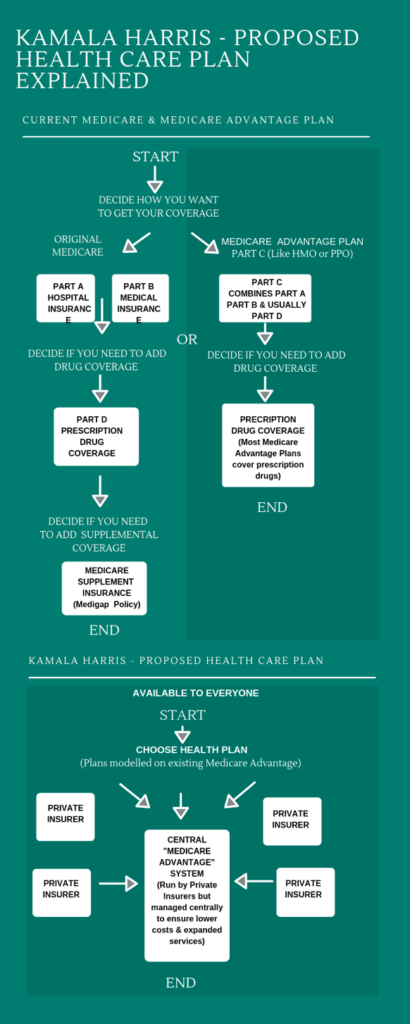Health care is a defining policy division among the presidential candidates. The Democratic field is in total agreement in its desire to provide universal coverage, but the candidates disagree on how to get there.
Sen. Bernie Sanders and Elizabeth Warren are closely associated with a “single-payer” European-style health care system. In opposition, Kamala Harris supports the creation of a universal version of a system, that has similarities to the existing Medicare program, but with a private insurer element – essentially turning insurance companies into public utilities and encouraging them to compete with the government delivered service.

Biden’s plan explicitly rejects the Medicare for All, the single-payer plan proposed by Bernie Sanders and backed by rival candidate Elizabeth Warren, defending Medicare as it currently exists. The Sanders plan would eliminate virtually all private insurance in the space of just four years and though polls show that Medicare for All is popular, the complete elimination of a private insurance option is not. Biden warns that with Medicare for All, “Medicare as you know it goes away.”
Kamala Harris’s proposition of a Medicare for All Plan, which will provide every individual in America with access to comprehensive health, promises that people will not experience an enforced change of Doctor as a result of the reform. President Obama made similar promises when referring to health changes under the Affordable Care Act in 2010 – “If you like your plan, you can keep your plan,” and “If you like your Doctor, you can keep your Doctor” Following this Democrats took possibly, the worst drubbing in modern political history (2nd November 2010) with Obama in his own words describing the loss of some 66 seats and half a dozen Senate seats as a “shellacking”.
Ms. Harris’s promise that people will not experience a change of Doctor assumes that since 91% of Medical Providers accept Medicare that this will automatically translate into 91% of people keeping their Doctor.
This is potentially flawed thinking for a couple of reasons;
Firstly, Medicare reimbursement rates are lower and the only reason doctors can accept Medicare patients is because private insurers pay higher reimbursement rates. If, by enforcing Medicare for all, the only rate available is the lower rate associated with Medicare, more doctors will opt out.
Secondly, Medicare advantage networks are not the same as Medicare Networks. Though similar in name, Medicare is the Federal Health Insurance Program that covers people aged 65 years or older, certain younger people with disabilities and patients with end-stage renal disease. The coverage is broken down into four distinct parts A, B, C and medicare part D and it is part C that is otherwise known as Medicare Advantage, a plan in which private companies contract with Medicare to provide Part A and Part B benefits.
By preserving a major role for private insurers, many which have profited advantageously from Medicare Advantage Plans and for calling for a 10-year phase as opposed to the four-year changeover envisioned by Mr. Sanders, Ms. Harris’s proposition could potentially draw less opposition then other proposals.
However, this proposal does little to address the headline health challenge of out of control costs. Though on paper Harris’s proposal looks like a simple solution to providing a universal Medicare system while preserving a major role for private insurers, it could possibly be massively expensive, disruptive and politically challenging and still fail to provide more affordable health care for Americans.
Read the article on What to do about chest pains at home?
Photo by Total Shape from Pexels

